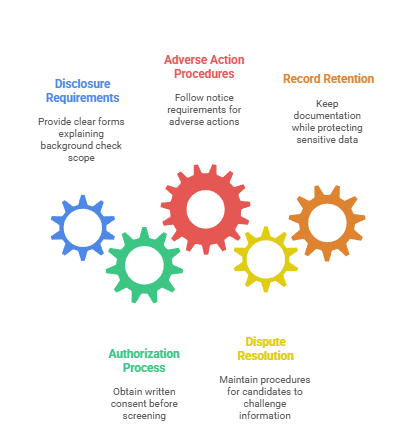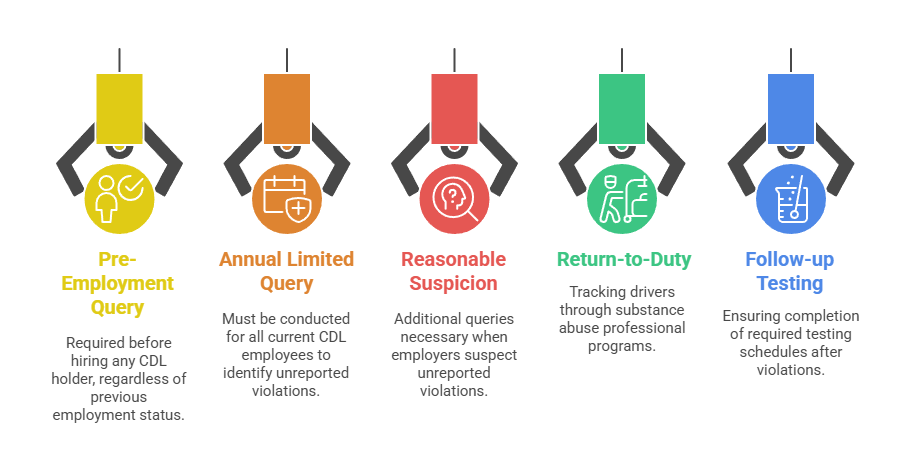Michigan CDL background checks combine federal FMCSA regulations with state-specific DOT requirements in 2025. Transportation employers must navigate both regulatory frameworks to ensure compliant hiring practices while meeting strict safety standards.
Key Takeaways
- Michigan CDL background checks require compliance with both federal FMCSA regulations and Michigan DOT state requirements for comprehensive driver screening.
- Commercial drivers must pass pre-employment screening, ongoing monitoring, and periodic background updates throughout their employment period.
- Criminal history checks examine both disqualifying offenses and serious traffic violations that can impact CDL eligibility and employment opportunities.
- Drug and alcohol testing records form a critical component of Michigan transportation background checks, with specific clearinghouse reporting requirements.
- Employment history verification must cover at least three years of previous commercial driving experience with detailed safety performance records.
- Michigan employers face significant liability risks and regulatory penalties for non-compliant background check processes in the transportation industry.
Understanding Michigan CDL Background Check Requirements

Michigan's commercial driving industry operates under a dual regulatory system in 2025. The Federal Motor Carrier Safety Administration establishes baseline standards for all commercial drivers. Meanwhile, Michigan's Department of Transportation adds supplementary requirements tailored to state operations. This comprehensive approach ensures that truck drivers meet the highest safety standards before operating commercial vehicles on Michigan roads.
The integration of federal and state requirements creates a multi-layered screening process. Michigan CDL background checks evaluate various aspects of a driver's background. Transportation employers examine driving records, criminal history, employment verification, and drug testing records through both FMCSA databases and state-maintained systems. Furthermore, employers must understand both regulatory frameworks to maintain compliance and avoid costly violations.
Michigan's approach to CDL background screening reflects the state's significant role in interstate commerce. Major transportation corridors connect the Great Lakes region to national markets. The state's emphasis on thorough background checks helps maintain Michigan's reputation as a reliable hub for commercial transportation. Additionally, this approach protects public safety on busy highways and urban areas throughout the state.
Federal FMCSA Background Check Components
Driver Qualification File Requirements
The FMCSA mandates that all motor carriers maintain comprehensive driver qualification files. These files contain specific background check documentation required by federal law. Motor carriers must include a completed application for employment, motor vehicle record from each state where the driver held a license during the previous three years, and a road test certificate or equivalent.
Additionally, employers must obtain annual motor vehicle record updates. They also maintain current medical examiner certificates for all commercial drivers. Drug and alcohol testing records represent another critical component of federal background check requirements. The FMCSA Drug and Alcohol Clearinghouse contains records of all CDL holders who have violated federal drug and alcohol testing regulations. Employers must query the clearinghouse before hiring any commercial driver and conduct annual queries for current employees.
Disqualifying Offenses Under Federal Law
Federal regulations establish specific criminal offenses and traffic violations that disqualify individuals from obtaining or maintaining a CDL. These disqualifying offenses vary in duration, with some resulting in lifetime disqualification while others impose temporary restrictions. Understanding these federal standards helps both job seekers and employers navigate the complex landscape of CDL eligibility requirements.
| Offense Category | Disqualification Period |
| Felony involving controlled substances with CMV | Lifetime |
| Felony involving CMV (non-drug) | Lifetime |
| Refusing alcohol/drug test while operating CMV | Lifetime |
| Multiple serious violations | 60-120 days |
| DUI in any motor vehicle | 1 year |
| Leaving scene of accident | 1 year |
These federal disqualifications apply nationwide and cannot be waived by state authorities. Michigan employers must verify that prospective drivers do not have any disqualifying offenses before extending job offers.
FMCSA Clearinghouse Integration
The FMCSA Drug and Alcohol Clearinghouse became fully operational in 2020. However, 2025 brings enhanced reporting requirements and stricter compliance monitoring. Employers must conduct pre-employment full queries and annual limited queries for all CDL holders. The system now includes improved data sharing between employers and better tracking of return-to-duty processes.
Recent updates to the clearinghouse system include faster processing times and enhanced violation reporting. Employers can now receive real-time notifications when their drivers have violations reported by other employers. This improvement helps maintain fleet safety and ensures compliance with federal drug and alcohol testing requirements.
Michigan State DOT Background Check Requirements
Michigan's Department of Transportation supplements federal requirements with additional background check components. The Michigan DOT background check process includes enhanced criminal history screening in 2025. State-specific driving record evaluation and additional documentation requirements apply to certain types of commercial operations. These state requirements often exceed federal minimums, reflecting Michigan's commitment to transportation safety.
The state's approach to background screening includes evaluation of non-CDL driving records. Criminal history that might not be captured in federal databases receives additional scrutiny. Michigan DOT requirements also address specific types of commercial operations common in the state. These include hazardous materials transport, passenger vehicle operations, and specialized freight hauling. This comprehensive screening helps ensure that commercial drivers meet all applicable safety standards for their specific type of operation.
Michigan's enhanced requirements reflect the state's position as a major transportation hub. The state faces unique safety challenges that require tailored solutions. The state's approach balances federal compliance with local safety priorities. Consequently, this creates a thorough screening process that benefits both employers and the traveling public throughout Michigan.
Criminal History Screening for Michigan Commercial Drivers
State and Federal Criminal Background Checks
Michigan CDL background checks must include both state and federal criminal history screening. This ensures comprehensive evaluation of prospective commercial drivers in 2025. State-level checks examine Michigan criminal records, including felony convictions, misdemeanor offenses, and pending charges. These factors might impact driving eligibility under current regulations.
Federal background checks review FBI databases for multi-state criminal activity. They also examine federal offenses that could disqualify individuals from commercial driving positions. The seven-year lookback period for most criminal offenses aligns with Fair Credit Reporting Act guidelines. However, certain serious offenses may be considered regardless of when they occurred.
FCRA Compliance in Criminal History Screening
Fair Credit Reporting Act compliance remains essential when conducting Michigan CDL background checks. This particularly applies to criminal history screening components in 2025. Employers must provide proper disclosure and authorization forms before initiating background checks. They must allow candidates to review and dispute adverse findings. Furthermore, employers must follow adverse action procedures when criminal history influences hiring decisions.

- Disclosure Requirements: Provide clear, standalone forms explaining background check scope
- Authorization Process: Obtain written consent before conducting any screening
- Adverse Action Procedures: Follow proper pre-adverse and final adverse action notice requirements
- Dispute Resolution: Maintain procedures for candidates to challenge inaccurate information
- Record Retention: Keep documentation for required periods while protecting sensitive data
Michigan employers must balance FCRA compliance with DOT safety requirements. This dual compliance approach protects both job seekers' rights and public safety interests.
Employment and Reference Verification Process
The employment verification component of Michigan CDL background checks requires thorough documentation. Employers must examine a driver's previous commercial driving experience and safety performance. Motor carriers must contact previous employers for at least the preceding three years. They obtain safety performance history, including accident records, traffic violations, and any drug or alcohol testing violations. This verification process helps identify patterns of unsafe behavior that might not appear in other background check components.
Previous employer contacts must provide specific information about the driver's safety performance. This includes details about preventable accidents, moving violations, and any instances of refusal to submit to drug or alcohol testing. Michigan DOT recommendations suggest extending employment verification to five years when possible. This provides a more comprehensive view of a driver's commercial driving history and safety record.
The employment verification process can be challenging when previous employers are no longer in business. Additionally, some employers fail to maintain adequate records from previous years. Michigan regulations require employers to document good faith efforts to obtain this information. They must maintain records of all verification attempts, whether successful or unsuccessful. This documentation helps demonstrate compliance during DOT audits and inspections.
Motor Vehicle Record Analysis
Michigan Secretary of State MVR Requirements
Michigan commercial driver motor vehicle records provide comprehensive information about driving history in 2025. These records include license status and traffic violations that directly impact CDL eligibility. The Michigan Secretary of State maintains detailed MVR records that include commercial and non-commercial driving violations. They also contain license restrictions and current CDL endorsements.
| MVR Component | Information Included | Impact on CDL |
| Traffic Violations | Moving violations, serious offenses | Point accumulation, potential disqualification |
| License Status | Current validity, restrictions | Determines eligibility for employment |
| Endorsements | HazMat, passenger, school bus | Required for specific operations |
Employers must obtain current MVR reports and understand how to interpret the various codes and violations. This knowledge helps make informed hiring decisions and maintain compliant driver qualification files.
Multi-State MVR Requirements
Commercial drivers often hold licenses or operate vehicles in multiple states. This requires employers to obtain MVR reports from all jurisdictions where drivers have been licensed during the previous three years. Multi-state coordination ensures that employers have complete information about a driver's traffic violation history. The Commercial Driver License Information System helps coordinate information sharing between states.
However, employers may need to request records directly from individual state licensing agencies. The complexity of multi-state MVR requirements increases when drivers have frequently moved between jurisdictions. State record-keeping systems don't always communicate effectively with each other. Therefore, Michigan employers must maintain documentation of all MVR requests and follow up on any gaps in driving history.
Drug and Alcohol Testing Records
FMCSA Drug and Alcohol Clearinghouse requirements significantly impact Michigan CDL background checks in 2025. The centralized database contains records of commercial drivers who have violated federal drug and alcohol testing regulations. Employers must conduct full queries before hiring any commercial driver. They must also perform annual limited queries for current employees. This system ensures that drivers cannot hide drug and alcohol violations by moving between employers or states.
The clearinghouse contains records of positive drug tests and alcohol test results of 0.04 or higher. It also includes refusals to test and other violations of FMCSA drug and alcohol testing requirements. Before a driver with clearinghouse violations can return to duty, they must complete the return-to-duty process. This involves working with a Department of Transportation qualified substance abuse professional and passing required follow-up testing.

- Pre-Employment Full Query: Required before hiring any CDL holder, regardless of previous employment status
- Annual Limited Query: Must be conducted for all current CDL employees to identify unreported violations
- Reasonable Suspicion Query: Additional queries necessary when employers suspect unreported violations
- Return-to-Duty Monitoring: Tracking drivers through substance abuse professional programs
- Follow-up Testing: Ensuring completion of required testing schedules after violations
Michigan employers must understand both clearinghouse requirements and traditional drug testing record verification. This dual approach helps identify both recent violations and historical issues that predate the system's implementation.
Background Check Timelines and Processes
The Michigan CDL background check process typically requires 5-10 business days for completion in 2025. However, complex cases involving multiple states or criminal history verification may take longer. Employers should plan for potential delays in obtaining employment verification from previous motor carriers. This particularly applies when contacting companies that have changed ownership or ceased operations. Starting the background check process early in the hiring timeline helps prevent delays in bringing new drivers into service.
Expedited background check services are available for urgent hiring needs. Nevertheless, these services may not include all required verification components. Michigan DOT requirements cannot be waived for speed, meaning that all essential background check elements must be completed. This applies before allowing new drivers to operate commercial vehicles, regardless of business urgency or driver shortages.
Technology improvements in 2025 have streamlined many aspects of the background check process. Electronic verification systems now provide faster access to driving records and employment history. Automated clearinghouse queries reduce processing times for drug and alcohol testing record reviews. However, certain components like employment verification still require direct contact with previous employers and may experience delays.
Costs and Compliance Considerations
Background Check Cost Structure
Michigan CDL background check costs vary depending on the scope of screening required and the services used. Basic federal compliance screening typically ranges from $75 to $150 per candidate in 2025. Enhanced screening that includes extended criminal history searches and comprehensive employment verification may cost $200 to $350 per candidate.
- Basic Federal Screening: $75-$150 per candidate
- Enhanced State Screening: $150-$250 per candidate
- Comprehensive Multi-State: $250-$350 per candidate
- Expedited Processing: Additional $50-$100 fee
- Annual Updates: $40-$75 per driver
These costs represent investments in safety and compliance that help prevent much larger expenses associated with accidents, violations, and regulatory penalties. Michigan employers should budget for both initial screening costs and ongoing monitoring expenses.
Compliance Documentation Requirements
Proper documentation of background check processes protects Michigan employers during DOT audits and safety inspections. Employers must maintain driver qualification files that demonstrate compliance with all applicable screening requirements. These files should include evidence of all background check components, employment verification attempts, and ongoing monitoring activities.
Documentation must be organized and easily accessible during inspections. Digital record-keeping systems help ensure that all required information is properly maintained and quickly retrievable. Regular internal audits of driver qualification files help identify any missing documentation before official inspections occur.
Industry-Specific Requirements
Hazardous Materials Transportation
Commercial drivers who transport hazardous materials face additional background check requirements beyond standard CDL screening. The Transportation Security Administration requires a Hazmat endorsement background check that includes federal terrorism databases and enhanced criminal history screening. This process involves fingerprinting and can take several weeks to complete in 2025.
Michigan employers who hire hazmat drivers must ensure that all TSA requirements are met in addition to standard FMCSA and state screening. The hazmat endorsement must be renewed every five years, requiring repeated background checks throughout a driver's career. Employers should plan for these extended timelines when hiring drivers for hazmat operations.
Passenger Transportation Services
Drivers who operate commercial passenger vehicles face enhanced background check requirements that focus on public safety. Michigan school bus drivers must complete additional state-specific screening that includes child abuse registry checks and extended criminal history review. Charter bus and public transportation drivers may have similar enhanced requirements depending on their specific operations.
These additional requirements reflect the higher safety standards expected for drivers who transport passengers. Michigan employers in the passenger transportation sector must understand both general CDL requirements and industry-specific screening standards. This ensures complete compliance and helps maintain public trust in commercial passenger services.
Technology and Background Check Modernization
Digital transformation has significantly improved the efficiency and accuracy of Michigan CDL background checks in 2025. Electronic verification systems now provide real-time access to driving records, criminal history, and employment information. Automated workflows help ensure that all required screening components are completed and properly documented.
Artificial intelligence and machine learning technologies help identify potential red flags in background check results. These systems can highlight discrepancies in employment history, flag concerning patterns in driving records, and alert employers to potential compliance issues. However, human oversight remains essential for making final hiring decisions and ensuring fair treatment of all candidates.
Integration between various databases has improved significantly, reducing the time required to complete comprehensive background checks. The FMCSA clearinghouse now connects more effectively with state licensing systems and employer databases. This connectivity helps ensure that no violations are missed during the screening process.
Common Challenges and Solutions
Michigan employers frequently encounter challenges when conducting CDL background checks, particularly with employment verification and multi-state record retrieval. Companies that have gone out of business or changed ownership may not have accessible employment records. Additionally, some states have slower response times for driving record requests, creating delays in the hiring process.
Solutions to these challenges include working with experienced background check providers who have established relationships with various agencies and databases. Maintaining detailed documentation of all verification attempts helps demonstrate good faith compliance efforts. Starting background checks early in the hiring process provides time to address any complications that arise.
Communication with job candidates throughout the background check process helps manage expectations and maintain positive relationships. Transparency about potential delays and clear explanations of requirements help candidates understand the thoroughness of the screening process. This approach demonstrates professionalism and commitment to safety standards.
Conclusion
Michigan CDL background checks in 2025 represent a critical intersection of federal safety regulations and state-specific requirements. The comprehensive screening process protects both transportation companies and public safety through thorough evaluation of criminal history, driving records, employment verification, and drug testing records. Success in Michigan's transportation industry requires understanding both FMCSA and Michigan DOT requirements while maintaining strict compliance with fair hiring practices. Transportation employers who invest in thorough background check processes build safer fleets, reduce liability exposure, and contribute to Michigan's reputation as a leader in commercial transportation safety.
Frequently Asked Questions
How long does a Michigan CDL background check take in 2025?
Most Michigan CDL background checks require 5-10 business days for completion, though complex cases involving multiple states, extensive criminal history, or difficult employment verification may take up to 15 business days. Employers should plan accordingly and start background checks early in the hiring process to avoid delays in bringing new drivers into service.
What disqualifies someone from getting a CDL in Michigan?
Michigan CDL disqualifications include federal offenses such as using a commercial vehicle in felony drug crimes, DUI convictions, leaving accident scenes, and serious traffic violations. Additional Michigan-specific disqualifications may apply based on state criminal history and driving record evaluation, with some offenses resulting in permanent disqualification while others impose temporary restrictions.
Do Michigan employers need to check the FMCSA Drug and Alcohol Clearinghouse?
Yes, all Michigan employers hiring CDL drivers must conduct full clearinghouse queries before employment and annual limited queries for current employees. This federal requirement cannot be waived and applies to all commercial drivers regardless of the type of operation, with enhanced reporting features available in 2025.
How far back do Michigan CDL background checks go?
Federal requirements mandate a minimum 3-year lookback for employment verification and driving records, while criminal history checks typically cover 7 years. Michigan DOT recommendations suggest extending these timeframes to 5 years for employment verification and 10 years for criminal history when possible for more comprehensive screening.
Can someone with a criminal record get a CDL in Michigan?
Criminal records don't automatically disqualify CDL candidates unless they involve specific federal disqualifying offenses. Michigan employers must evaluate criminal history based on job-relatedness, rehabilitation evidence, and public safety factors while following FCRA compliance requirements and considering the nature and timing of offenses.
What are the costs associated with Michigan CDL background checks?
Michigan CDL background check costs typically range from $75-$150 for basic federal compliance screening to $250-$350 for comprehensive multi-state screening in 2025. Additional costs include expedited processing fees, annual updates, and industry-specific requirements such as hazmat endorsement screening.
Additional Resources
- FMCSA Drug and Alcohol Clearinghouse Official Guide
https://clearinghouse.fmcsa.dot.gov/ - Michigan Department of Transportation Commercial Vehicle Services
https://www.michigan.gov/mdot/travel/commercial - Federal Motor Carrier Safety Administration Driver Requirements
https://www.fmcsa.dot.gov/registration/commercial-drivers-license - Michigan Secretary of State CDL Information
https://www.michigan.gov/sos/resources/driving-record/cdl - FCRA Compliance Guide for Transportation Employers
https://www.ftc.gov/enforcement/rules/rulemaking-regulatory-reform-proceedings/fair-credit-reporting-act - DOT Physical and Medical Certification Requirements
https://www.fmcsa.dot.gov/medical/driver-medical-requirements

GCheck Editorial Team
Meet the GCheck Editorial Team, your trusted source for insightful and up-to-date information in the world of employment background checks. Committed to delivering the latest trends, best practices, and industry insights, our team is dedicated to keeping you informed.
With a passion for ensuring accuracy, compliance, and efficiency in background screening, we are your go-to experts in the field. Stay tuned for our comprehensive articles, guides, and analysis, designed to empower businesses and individuals with the knowledge they need to make informed decisions.
At GCheck, we're here to guide you through the complexities of background checks, every step of the way.





